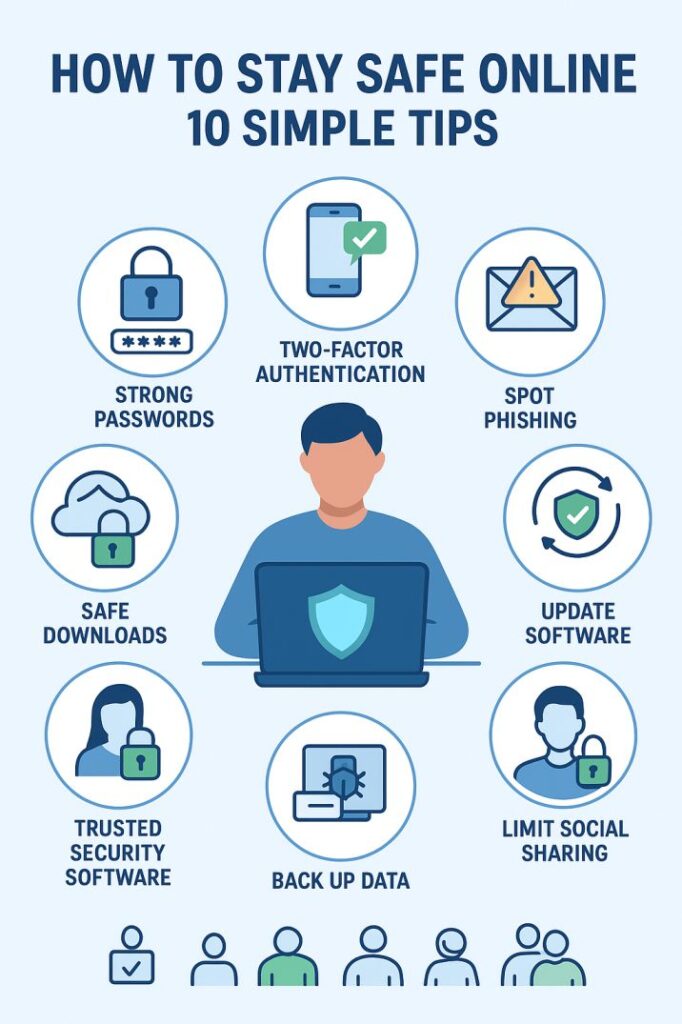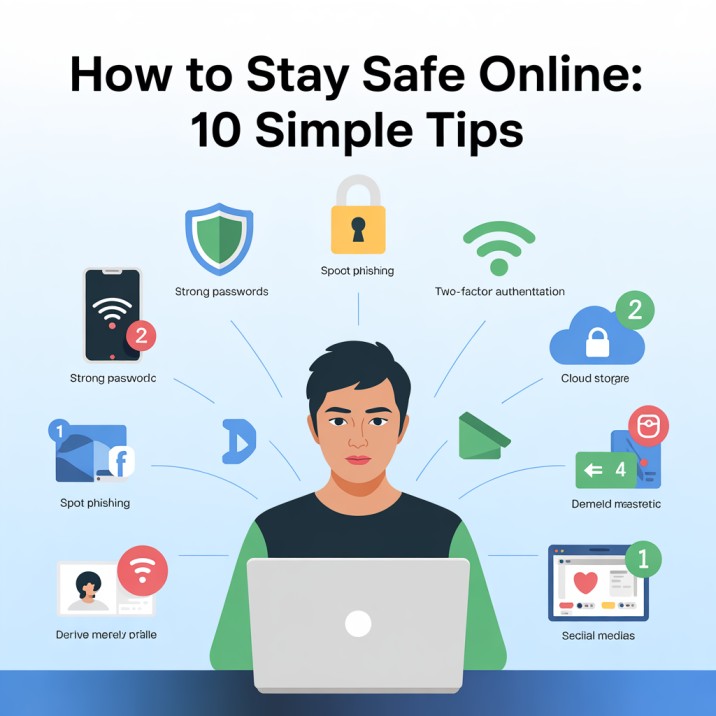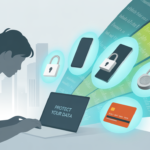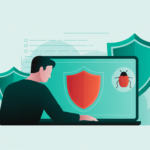Introduction: Why Online Safety Isn’t Optional
The internet is woven into every part of our lives. From banking and shopping to social media and remote work, we leave digital footprints everywhere we go. But with convenience comes risk cybercriminals are constantly looking for ways to exploit weak security habits. That’s why learning how to stay safe online tips is no longer optional. It’s the modern version of locking your front door, shredding sensitive mail, or double-checking who you trust. The difference? Online threats can reach you at lightning speed whether through phishing emails, hacked Wi-Fi, or malware-laced downloads.
The good news: staying safe doesn’t require being a tech genius. With the right habits and awareness, you can protect your identity, money, and peace of mind. Let’s break down 10 practical, research-backed tips to make your online life more secure.
Tip 1: Use Strong, Unique Passwords
Weak passwords are still the number one entry point for hackers. According to NordPass, “123456” and “password” remain shockingly common.
Here’s the fix:
- Aim for at least 12–16 characters
- Mix uppercase, lowercase, numbers, and symbols
- Avoid personal details like birthdays or pet names
👉 Better yet, use a password manager like Bitwarden or 1Password to generate and store strong, unique logins.
Tip 2: Enable Two-Factor Authentication (2FA)
Even the strongest password can be stolen. That’s where 2FA steps in it adds an extra lock on your digital door. With 2FA, you’ll need a code from your phone or authenticator app in addition to your password.
This simple step blocks most hacking attempts, even if someone knows your login. Services like Google, Facebook, and major banks all support it.
Tip 3: Beware of Phishing Emails and Scams
Phishing remains one of the most effective cyberattack methods. These emails or texts look legitimate often imitating banks, delivery companies, or even friends but they’re designed to steal your data.
To spot phishing:
- Look for spelling errors or odd phrasing
- Hover over links to see the real destination
- Be skeptical of urgent “act now” messages
If in doubt, don’t click, visit the official website directly.
Tip 4: Keep Your Software Updated
Cybercriminals love outdated software because it’s full of unpatched security holes. Whether it’s your operating system, browser, or phone apps, updates often include critical security fixes.
Set updates to install automatically when possible. Yes, restarts can be annoying but not as annoying as dealing with ransomware.
Tip 5: Secure Your Wi-Fi Network
An unsecured Wi-Fi network is like leaving your house door wide open. Hackers can intercept your traffic, steal logins, or even launch attacks from your connection.
Quick fixes:
- Change the default router password
- Use WPA3 (or at least WPA2) encryption
- Hide your network name (SSID)
- Avoid logging into sensitive accounts on public Wi-Fi without a VPN
Tip 6: Limit What You Share on Social Media
That “harmless” post about your dog Max or your mother’s maiden name? Hackers use those details to guess passwords or security questions. Oversharing makes you an easier target for identity theft.
Practical steps:
- Keep personal info (like birthdays and addresses) private
- Adjust your privacy settings
- Think before posting vacation plans (burglars also love oversharing)
Tip 7: Back Up Your Data Regularly
Imagine losing all your photos, work files, or financial records to ransomware or a hard-drive crash. Backups ensure you won’t be held hostage.
Best practice:
- Use a combination of cloud storage and external hard drives
- Follow the “3-2-1 rule”: 3 copies of your data, 2 different formats, 1 stored offline
Tip 8: Use Trusted Security Software
Antivirus software isn’t outdated it’s still a critical layer of defense against malware, spyware, and ransomware. Look for reputable providers like Norton, Kaspersky, or Malwarebytes.
Also consider enabling built-in protections, such as Windows Defender or macOS Gatekeeper.
Tip 9: Verify App and Download Sources
Free software, games, or plugins can sometimes come with hidden malware. Always download apps from official stores (Google Play, Apple App Store) or the developer’s verified website.
If something seems “too good to be true,” it usually is.
Tip 10: Educate Yourself and Your Family
Cyber threats evolve daily. The best defense is staying informed. Share online safety habits with your children, parents, or less tech savvy friends.
Resources like CISA’s Stay Safe Online or cybersecurity blogs offer practical, non-technical guidance.

Comparison Table: Bad Habits vs. Safer Alternatives
| Common Risky Habit | Safer Alternative |
|---|---|
| Using the same password everywhere | Use a password manager with unique logins |
| Clicking on suspicious links | Verify source and type URL manually |
| Ignoring updates | Enable automatic updates |
| Logging into bank accounts on café Wi-Fi | Use VPN or wait for a secure connection |
| Posting personal details on social media | Limit public info and adjust privacy settings |
Personal Reflection: My Online Safety Wake-Up Call
A few years ago, I fell victim to a phishing scam that mimicked my bank. The email looked flawless logo, colors, everything. I clicked, entered my info, and within hours saw unauthorized charges.
It was terrifying but also the wake-up call I needed. I learned firsthand that online safety isn’t about paranoia, it’s about preparedness. Since then, I’ve followed these 10 tips, and they’ve become second nature.
Why These Tips Matter More Than Ever
With the rise of AI-driven scams and deepfake frauds, cyber threats are getting smarter. Criminals no longer send poorly written spam they tailor attacks to your habits, interests, and even voice patterns.
That’s why basic online safety hygiene is more important than ever. Each of these tips is like a brick in your digital fortress. Alone, they help. Together, they create resilience.
Conclusion: Make Online Safety a Daily Habit
Learning how to stay safe online tips isn’t about adding stress it’s about giving yourself peace of mind. Just like wearing a seatbelt or locking your doors, these habits become second nature with practice.
To recap:
- Use strong, unique passwords
- Turn on 2FA everywhere
- Stay alert to phishing scams
- Update your software
- Secure your Wi-Fi and devices
- Back up your data
- Share awareness with others
The internet can be empowering, but only if you’re using it wisely. Small changes today can prevent big regrets tomorrow.
Call-to-Action: Take Your First Step Today
Don’t try to do all 10 tips at once. Start small:
- Update one weak password right now
- Turn on two-factor authentication for your email
- Share one safety tip with a friend or family member
Your digital life is valuable protect it. Which of these online safety tips will you commit to today?



